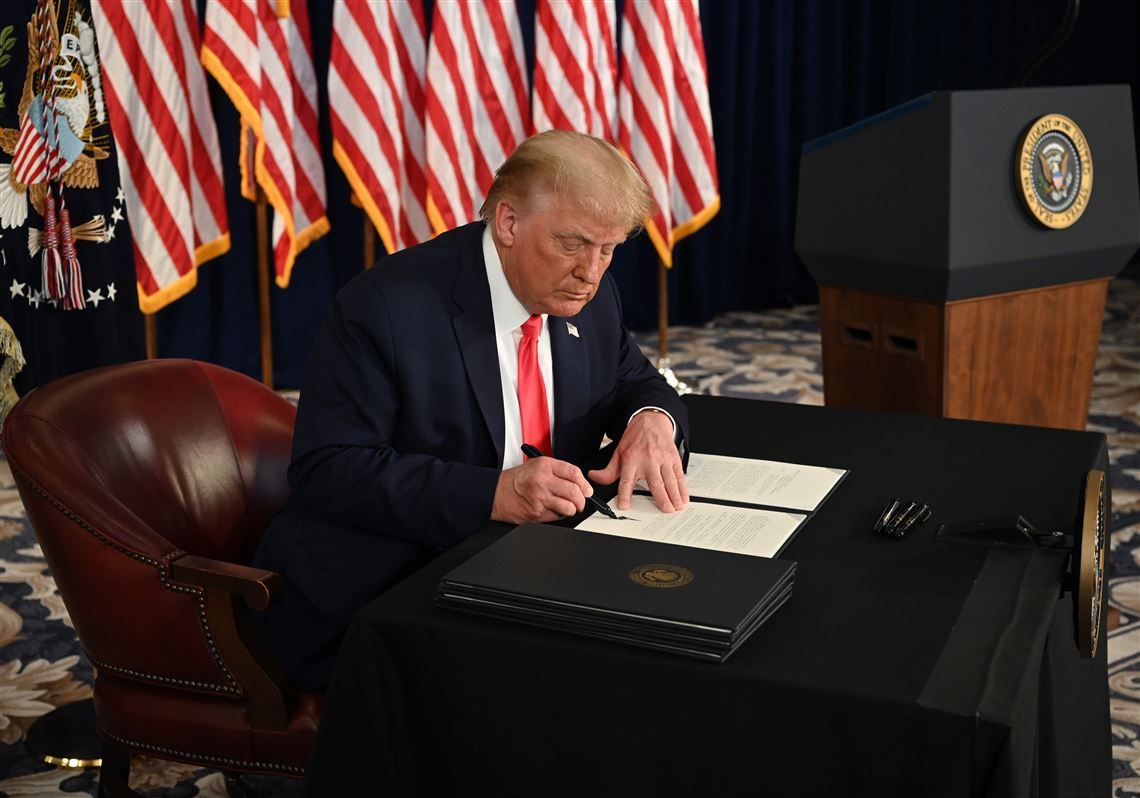Trump signs executive order after COVID-19 relief bill talks stall in Congress

A few minutes every morning is all you need.
Stay up to date on the world's Headlines and Human Stories. It's fun, it's factual, it's fluff-free.
President Donald Trump signed four executive actions on Saturday that will provide US$400 in additional weekly unemployment benefits, defer payroll tax from employees’ salaries, extend the deferment on student loan payments and “provide assistance to renters and homeowners.”
Trump’s executive order challenges the boundaries of power between the Congress and White House by unilaterally making changes to tax and spending policies. These powers are granted to the Congress by the Constitution.
Trump’s orders come after COVID-19 relief bill negotiations between Democrats and Republicans have stalled in Congress due to a lack of bipartisan consensus.
At a news conference in Bedminster, New Jersey, Trump stated that his four orders “will take care of pretty much this entire situation.” But experts say that his orders are unlikely to provide much needed extensive material benefits to Americans.
Complications with the memorandum on unemployment benefits
Trump stated that the US$400 a week in additional unemployment aid to Americans is “generous but we want to take care of our people.” Trump added that the US$400 per week “gives [Americans] a great incentive to go back to work."
However, it remains to be seen if the order can provide timely aid to struggling Americans.
Under the order, the states will have to enter into an agreement with the federal government to provide additional unemployment benefits to its citizens. As part of the agreement, the state will pay 25% or US$100 of the total amount to unemployed Americans.
The federal government will utilize the US$44 billion from the Disaster Relief Fund to pay the remaining 75% or US$300.
However, according to Congressional Democrats and unemployment experts, these funds will likely be depleted within two months, after which the White House may have to ask Congress for more money.
Trump also did not say when Americans will start getting the benefits.
Furthermore, according to the memorandum, unemployed individuals will only receive US$300 from the federal government if they first qualify for the US$100 in state benefits. This provision makes it unlikely that many individuals will see any additional unemployment benefits.
Multiple states are also dealing with budget crises due to the loss of tax revenue during the pandemic. Because states are required to provide unemployment insurance to their citizens, many state funds have also been depleted.
10 states have already borrowed approximately US$20 billion from the Treasury Department to cover the cost of the unemployment benefits they are expected to provide.
Experts say that a state may choose to not enter into an agreement with the federal government to provide unemployment benefits due to the state’s own lack of funds, meaning that unemployed individuals in that state will get no additional benefits other than the unemployment insurance that states provide.
As relief talks are currently stalled in Congress, the possibility of states getting new aid from the federal government remains to be seen.
Another issue is that instead of putting additional money into the now lapsed US$600 per week unemployment program, the order calls for states to set up a new program for “lost wages.” Such a program could take months to be implemented.
“This is a brand new program, it’s an assistance program for lost wages, it requires the creation of an entirely new administrative system,” Michele Evermore, an unemployment expert at the National Employment Law Project, told CNN.
“The states that don’t get the program set up as quickly as other states aren’t going to get any funding because it will run out," she added.
In a joint statement, Democratic House Speaker Nancy Pelosi and Senate Democratic leader Chuck Schumer said that “These policy announcements provide little real help to families.”
“Instead of passing a bill, now President Trump is cutting families’ unemployment benefits and pushing states further into budget crises, forcing them to make devastating cuts to life-or-death services.”
Shortfalls in the executive order to provide relief to renters and homeowners
Meanwhile, Trump’s executive order “to provide assistance to renters and homeowners” only suggests that federal agencies provide such assistance instead of actually extending the moratorium on evictions nationwide.
The order asks the Department of Health and Human Services (HHS) and the Centers for Disease Control and Prevention (CDC) to “consider” whether the moratorium on evictions should be extended.
It also asks the Treasury Department and the Department of Housing and Urban Development to “identify” the federal funds that can be used to provide financial relief to renters and homeowners struggling to pay rent and mortgage.
Pelosi and Schumer pointed out in their statement that such federal financial assistance is necessary as a moratorium on evictions means that people will eventually have to pay back the piling rent and mortgage money they owe.
“Not only does the President’s announcement not actually extend the eviction moratorium, it provides no assistance to help pay the rent, which will only leave desperate families to watch their debt pile higher.”
Trump’s order to defer employees’ payroll taxes leaves unanswered questions
Another order signed by Trump calls for the deferment of payroll taxes for those employees who earn less than US$100,000 annually. Employees pay 6.2% of their income in taxes to fund Social Security and 1.45% to fund Medicare.
This controversial measure has no support among either Democrats or Republicans. It remains unclear where the already financially strained welfare programs will get their funding from if there are cuts in payroll taxes.
Trump said that if he is reelected, he will forgive the deferred taxes and make the cuts on payroll tax “permanent.”
Whether companies will comply with this order remains to be seen. If the currently deferred taxes are not forgiven then companies could cut large sums of money from employees’ salaries when taxes are due.
McConnell’s statement
Although Trump’s orders have been heavily criticized, Republican Senate Majority leader Mitch McConnell praised them in a statement Saturday, blaming Democrats for sabotaging COVID-19 relief bill negotiations.
“Struggling Americans need action now. Since Democrats have sabotaged backroom talks with absurd demands that would not help working people, I support President Trump exploring his options to get unemployment benefits and other relief to the people who need them the most."
“Weeks ago, some predicted that Speaker Pelosi and Minority Leader Schumer might actually prefer if the American people received no further bipartisan aid before the election. Sadly, they have done nothing to suggest otherwise.”
McConnell was one of the main architects of the US$1 trillion Senate relief package that failed to gain the support of Democrats and multiple Republicans.
Have a tip or story? Get in touch with our reporters at tips@themilsource.com




Comments ()